Filter by

Financial Crisis Management and Democracy: Lessons from Europe and Latin America
This open access book discusses financial crisis management and policy in Europe and Latin America, with a special focus on equity and democracy. Based on a three-year research project by the Jean Monnet Network, this volume takes an interdisciplinary, comparative approach, analyzing both the role and impact of the EU and regional organizations in Latin America on crisis management as well as t…
- Edition
- -
- ISBN/ISSN
- 978-3-030-54895-7
- Collation
- -
- Series Title
- -
- Call Number
- -
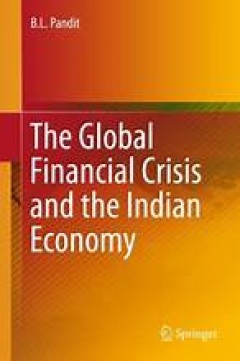
The Global Financial Crisis and the Indian Economy
After tracing the causes of the global financial crisis, the book focuses on two fundamental systemic issues connected with its manifestation: financial-sector regulation and the problem of the dollar-centric international monetary system, both of which have been widely cited among the important factors leading to the 2008 financial crisis. The important analytical question of monetary policy t…
- Edition
- 1
- ISBN/ISSN
- 978-81-322-2395-5
- Collation
- XI, 142, 31 b/w illustrations
- Series Title
- -
- Call Number
- -
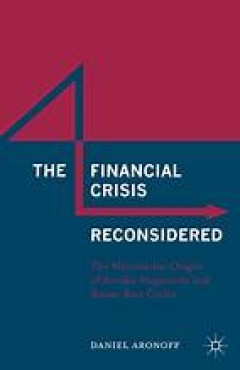
The Financial Crisis Reconsidered
In The Financial Crisis Reconsidered, Aronoff challenges the conventional view that reckless credit produced the US housing boom and the financial crisis, explaining how the large current account deficit, and its mercantilist origin, was a more fundamental cause. He also demonstrates that the decision to provide relief for bank creditors rather than underwater homeowners was responsible for the…
- Edition
- 1
- ISBN/ISSN
- 978-1-137-54789-7
- Collation
- XVII, 291
- Series Title
- -
- Call Number
- -
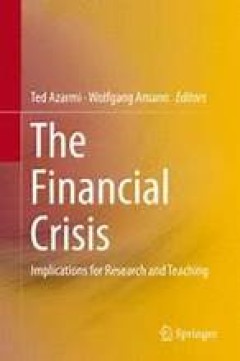
The Financial Crisis
This book brings together a good mix of academics and practitioners for a discussion that focuses on how to change financial practice and the academic field of finance in order to understand the current financial crisis and deal with future turbulent financial times. The volume is based on contributions by prominent academics and practitioners from Europe, Asia and the USA. The book contains se…
- Edition
- 1
- ISBN/ISSN
- 978-3-319-20588-5
- Collation
- XI, 175, 3 b/w illustrations, 22 illustrations in colour
- Series Title
- -
- Call Number
- -
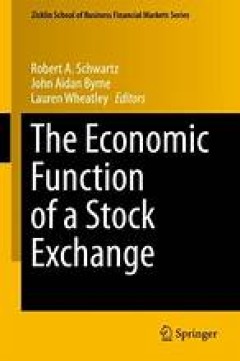
The Economic Function of a Stock Exchange
In recent years, exchanges on both sides of the Atlantic have been extensively reengineered, and their organizational structures have changed from non-profit, membership organizations to for-profit, demutualized organizations. Concurrently, new alternative trading systems have emerged and the traditional functions of broker/dealer firms have evolved. How have these changes affected the delivery…
- Edition
- 1
- ISBN/ISSN
- 978-3-319-10350-1
- Collation
- XXV, 129, 2 b/w illustrations, 13 illustrations in colour
- Series Title
- Zicklin School of Business Financial Markets Series
- Call Number
- -
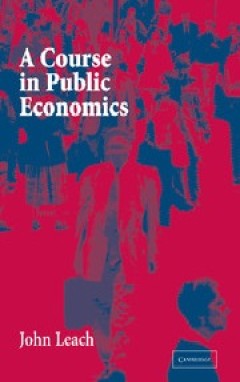
A Course in Public Economics
A Course in Public Economics, first published in 2004, explores the central questions of whether or not markets work, and if not, what is to be done about it. The first part of the textbook, designed for upper-level undergraduates and first-year graduate students, begins with an extended discussion of the two theorems of welfare economics. These theorems show that competitive markets can give r…
- Edition
- -
- ISBN/ISSN
- 9780511754180
- Collation
- -
- Series Title
- -
- Call Number
- -
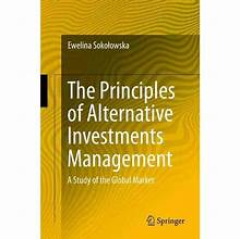
The Principles of Alternative Investments Management
The purpose of this book is to present the principles of alternative investments in management. The individual chapters provide a detailed analysis of various classes of alternative investments on the financial market. Despite many different definitions of alternative investments, it can be assumed that a classical approach to alternative investments includes hedge funds, fund of funds (FOF), m…
- Edition
- 1
- ISBN/ISSN
- 978-3-319-13215-0
- Collation
- XI, 186, 38 b/w illustrations, 4 illustrations in colour
- Series Title
- -
- Call Number
- -

Trade Strategy in East Asia From Regionalization to Regionalism
The study of regionalism is essential as it has become a vital trend with profound regional and global impacts. Japan, Korea and China are regarded as the key actors for such action in East Asia. While regionalization has created building blocks for economic integration, the act of exclusion from regionalism will only lead to marginalization. Therefore, it is important to learn how to make it w…
- Edition
- -
- ISBN/ISSN
- 978-1-137-56967-7
- Collation
- -
- Series Title
- -
- Call Number
- -
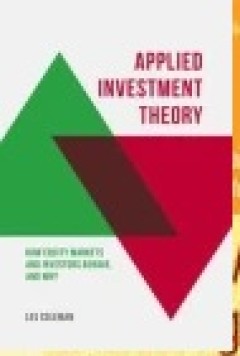
Applied Investment Theory: How Markets and Investors Behave, and Why
Institutions now dominate trading in equities around the world. Mutual funds are the most prominent, and doubly important as custodians of retirement savings. Despite this, there is no comprehensive description of fund manager behaviour, much less a matching theory. This is troubling because one of the most economically significant puzzles in finance is why experienced, well-resourced fund mana…
- Edition
- Ed. 1
- ISBN/ISSN
- 978-3-319-43976-1
- Collation
- XXV, 246
- Series Title
- -
- Call Number
- 339 COL a
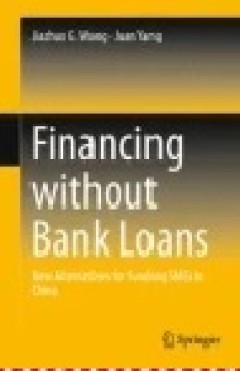
Financing without Bank Loans
This book covers all important financial innovations for SME financing, and combines theoretical analysis and real world practices employed in China’s financial market. As China is increasingly becoming a key player in the global economy, the book helps readers gain a better understanding of the current structure and operation of, as well as future changes in, the Chinese economy. Given the h…
- Edition
- -
- ISBN/ISSN
- 978-981-10-0901-3
- Collation
- XVII, 174
- Series Title
- -
- Call Number
- -
 Computer Science, Information & General Works
Computer Science, Information & General Works  Philosophy & Psychology
Philosophy & Psychology  Religion
Religion  Social Sciences
Social Sciences  Language
Language  Pure Science
Pure Science  Applied Sciences
Applied Sciences  Art & Recreation
Art & Recreation  Literature
Literature  History & Geography
History & Geography